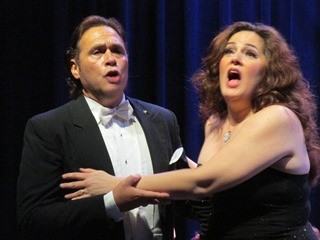|
Back
Miami Masquerade Miami
Colony Theatre
09/20/2014 - & September 21, 2014
Giuseppe Verdi: Un ballo in maschera
Julie-Anne Hamula (Oscar), Jorge Pita Carreras (Riccardo), Giancarlo Brunet (Renato), Benedetta Orsi (Ulrica), Rosa D’Imperio (Amelia), Enrique Estrada (Sam), Eric Dobkin (Tom), Massimiliano Collicelli (Judge), Gibson Dorce (Silvano)
Miami Lyric Opera Orchestra and Chorus, Pablo Hernandez (chorus master), Imre Pallo (conductor)
Raffaele Cardone (director)

J. Pita Carreras & R. D'Imperio (© Daniel Fernandez)
Though Un ballo in maschera is much beloved and deservedly so, those who want their Italian opera dished up with lots of sentiment will probably be disappointed. The libretto has lots of heat but little warmth. The characters just do not generate much sympathy. The story is a decent one and goes along at a good clip; despite the melodrama, it is not preposterous. Musically this work is right up there with Verdi’s best. Everyone has quirks; I personally find Oscar an annoying and unnecessary character and his (her) thrilling music can come off as pretty cutesy; but it also offers tremendous variety; a significant trouser role is not common in Verdi. The fact is this piece doesn’t have anything but hit after hit, so if the cast is up to the job, we are in for something significant.
And we got it. Under the control of conductor Imre Pallo this orchestra was at its tightest. Yeah, the strings and winds might have hit a couple wrong notes, but in addition to true Verdi passion, there was tasteful restraint and sensitivity. Because this was a concert production with no significant interfering stage action, the principals were situated in front of the musicians, which is not generally the case at this venue. The singers never had to strain for fear of being covered and the audience got a clearer idea of what an opera should sound like at the Colony Theatre. There are probably fewer than 25 instruments which lessened the largeness of sound, but no moment felt undernourished. Pablo Hernandez’ chorus continues to show significant growth and as with the orchestra, were it doubled in size would probably be inappropriate in a house of only 440 seats.
Though each principal had minor weaknesses, as an ensemble, it was unusually strong. Benedetta Orsi’s Ulrica was in full command. As is often the case with this role, her few very low notes could have been stronger but who can complain when a performer exhibits such a strong characterization. At the other end Julie-Anne Hamula’s Oscar might have been a bit shrill on the very top but the agility and spunk she gave to the page was every bit as solid. Her “Ah! Di che fulgor” set the tone that initiated a thrilling conclusion to the first scene of act three. Giancarlo Brunet was a believably wounded Renato, the one character who generates genuine pathos. His “Eri tu” was not what one has come to expect. On recording and in performance this famous aria is often belted, yet Brunet chose a much more subtle approach; his eventual loss of control bordered on tragic. Rosa D’Imperio’s dynamic feminine soprano created in Amelia a welcome depth of character not offered in the libretto. This powerful quartet was topped with the tenor of Jorge Pita Carreras. His is not a young voice, but that of a man in late middle age; and as a result has greater complexity. His pleasantly noticeable and controlled vibrato heightens the drama. Though his “Si, rivederti Amelia” is not one we would hear from a younger singer, it is shaped with elegance giving this great moment in opera its heroism along with the necessary sense of approaching doom. Carreras and company expressed the opera’s text in a clear manner that is not always captured even on the most famous of recordings.
Of all the operas I have seen at Miami Lyric Opera (which is most) there is no question that Ballo is the most demanding yet attempted. A concert version for a small company is a smarter strategy before committing to a fully staged production. So, if we are lucky, Raffaele Cardone will eventually give us the whole thing (with the cuts restored). His troupe nailed the musical part of it already.
Jeff Haller
|